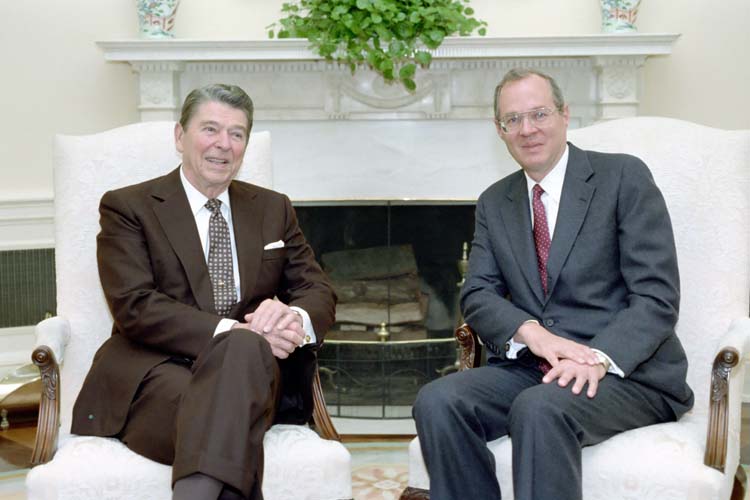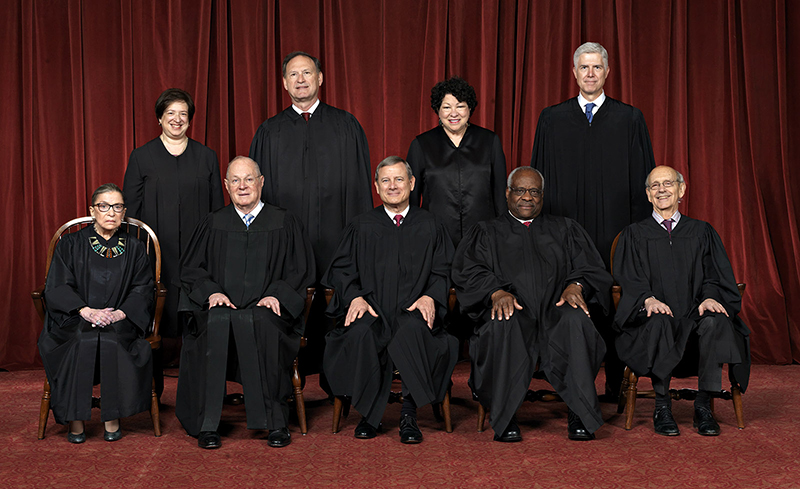On June 1992, we were all feeling a little uneasy at Americans United.
The Supreme Court had the previous November heard oral arguments in a case from Providence, R.I., concerning school-sponsored prayers during public school graduation ceremonies. We were awaiting a decision.
We didn’t have a good feeling about it. The high court was becoming more conservative. Early in 1988, a new justice had taken a seat on the court; his name was Anthony M. Kennedy.
Kennedy had been appointed by President Ronald W. Reagan, but he wasn’t Reagan’s first choice. Reagan originally named a judge named Robert Bork to the court. But the nomination of Bork, whose views were far to the right, sparked an intense backlash and a Senate fight that consumed several months. In the end, Bork failed to win confirmation, going down by a vote of 42 in favor and 58 against.
Reagan then nominated Douglas H. Ginsburg, a judge on the U.S. Court of Appeals for the District of Columbia Circuit. But Ginsburg’s nomination soon collapsed in the wake of reports that he had, in the 1960s and ’70s, smoked marijuana.
Kennedy, a federal appeals court judge in California, was Reagan’s next nominee, and the third time proved to be the charm. Kennedy sailed onto the court with little controversy, in part because his record was fairly scant – and not just on church-state issues. I started working at Americans United just weeks after Kennedy was nominated, and I was charged with the task of looking into his record. There wasn’t much to find.

(Photo: President Ronald Reagan with his Supreme Court nominee Anthony Kennedy in 1987. Credit: Ronald Reagan Presidential Library and Museum.)
But Kennedy soon gave us cause to worry. In a 1989 case dealing with the display of religious symbols on government property in Allegheny County, Pa., Kennedy groused that the court was on the wrong road when it came to church-state relations. He opined that “substantial revision” of the court’s jurisprudence in this area might be necessary.
Flash forward a few years to 1992, and you can tell why we were nervous. The school prayer rulings were at that time 30 years old. They had never been eroded. Speculation was that the court would, at the very least, allow official prayers at events such as graduation. Or it might go further and overturn the cases from 1962 and ’63, once again allowing public schools to sponsor daily prayers and Bible reading.
In those pre-internet days, the only way to quickly get a copy of a Supreme Court ruling was to physically go to the court and pick one up. If you were unable to go to the court and wanted to hear breaking news, you’d better stay near a radio or keep your television tuned to a 24-hour news channel.
We didn’t know when the ruling in the prayer case, Lee v. Weisman, would come down, but we suspected it would be sometime in June because it’s very rare for the high court to stay in session into July. On the morning of June 24, I was on Capitol Hill planning to attend a hearing on a piece of legislation we were following. When I arrived at the room where the hearing was supposed to take place, I learned it had been canceled. There were a few people there, and one of them told me that he had heard that the Supreme Court had just ruled in Weisman, but he wasn’t sure what the court had said.
Only very rich and very powerful people owned mobile phones at that time. That certainly didn’t describe me, so I had to dash outside and find a pay phone (remember those?) and call the Americans United office.
I heard the big news: Not only did the decision strike down school-sponsored graduation prayers, but it was written by none other than Anthony Kennedy!
I returned to the office to read the ruling and help prepare AU’s response to it. The first thing that struck me about it was the eloquence of Kennedy’s language.
“The First Amendment’s Religion Clauses,” Kennedy observed, “mean that religious expressions are too precious to be either proscribed or prescribed by the State.”
Continued Kennedy, “The lessons of the First Amendment are as urgent in the modern world as in the 18th Century when it was written. One timeless lesson is that if citizens are subjected to state-sponsored religious exercises, the State disavows its own duty to guard and respect that sphere of inviolable conscience and belief which is the mark of a free people. To compromise that principle today would be to deny our own tradition and forfeit our standing to urge others to secure the protections of that tradition for themselves.”
The lessons of the First Amendment are as urgent in the modern world as in the 18th Century when it was written. One timeless lesson is that if citizens are subjected to state-sponsored religious exercises, the State disavows its own duty to guard and respect that sphere of inviolable conscience and belief which is the mark of a free people. To compromise that principle today would be to deny our own tradition and forfeit our standing to urge others to secure the protections of that tradition for themselves.
~ Justice Anthony M. Kenndey, in Lee v. Weisman
Kennedy, citing research from psychological studies, noted that children can feel coerced to take part in school-sponsored worship. Such practices, he argued, place students under “subtle coercive pressure.”
The majority opinion infuriated Justice Antonin Scalia, who accused Kennedy of going on a “psycho-journey” and insisted that the prayers were harmless examples of non-sectarian civil religion.
Kennedy’s opinions on school prayer didn’t change throughout his 30-year tenure on the court. And in later years, he emerged as a champion of LGBTQ rights. He wrote the opinion in 1996’s Roemer v. Evans that invalidated a Colorado law that made it illegal for local jurisdictions to declare LGBTQ people a protected class. In 2003 he penned Lawrence v. Texas, which struck down state laws criminalizing consensual same-sex relations between adults. His most important ruling in this area was Obergefell v. Hodges (2015), which made marriage equality the law nationwide.
But Kennedy was in no way a consistent advocate of separation of church and state. On questions of taxpayer funding of religion, for example, he took a hard conservative line. Kennedy voted to uphold Ohio’s voucher plan in 2002 and approved other forms of government assistance to religion. In a 2007 case, he sided with a court majority that made it more difficult for taxpayers to sue when public funds are diverted for religious purposes.
Kennedy also saw no problems with government’s use and display of religious symbols. While he was obviously concerned about religion being imposed on impressionable youngsters in public schools, he didn’t extend that thinking to adults in other contexts. In 2014, he ruled in favor of legislative prayer before meetings of local government in Town of Greece v. Galloway, a case sponsored by Americans United.
On religious freedom issues, Kennedy’s record was also mixed. He agreed with the majority in a 1993 case challenging statutes in a Florida city that were clearly designed to curb controversial religious practices (in this case, the sacrifice of animals). But critics at Americans United believed he went too far in some cases. Kennedy sided with the Hobby Lobby Corporation in a 2014 case, ruling that the company had the right under a federal religious-freedom law to deny birth control to its employees, even though the Affordable Care Act requires that it be covered.
Due to this mixed record, Kennedy was often described as a swing vote on social issues. The truth is a little more nuanced: He was a reliable vote against any form of religious coercion or pressure of schoolchildren, and believed in equal treatment for LGBTQ Americans in many contexts. But on a host of other church-state issues, he was no supporter of the church-state wall.
Kennedy was often described as a swing vote on social issues. The truth is a little more nuanced: He was a reliable vote against any form of religious coercion or pressure of schoolchildren, and believed in equal treatment for LGBTQ Americans in many contexts. But on a host of other church-state issues, he was no supporter of the church-state wall.
And while many court observers look at these issues, especially LGBTQ rights, as Kennedy’s legacy, by retiring now he’s placing them in jeopardy. According to some media accounts, Kennedy agreed to retire only after getting an assurance from Trump that the president would name Kavanaugh, who once clerked for Kennedy, as his replacement.
Kavanaugh and Kennedy may share a close professional relationship, but their judicial philosophies diverge in some crucial areas. Kavanaugh openly boasts about being a fan of the far-right views of the late Chief Justice William H. Rehnquist, and his perspective is much closer to justices like Samuel A. Alito and Clarence M. Thomas.
By leaving the court now, Kennedy may be putting many of the issues he claims to care about in a very precarious place.

(Photo: The justices of the U.S. Supreme Court before Anthony Kennedy, seated second from left, retired in July 2018. Credit: U.S. Supreme Court.)


